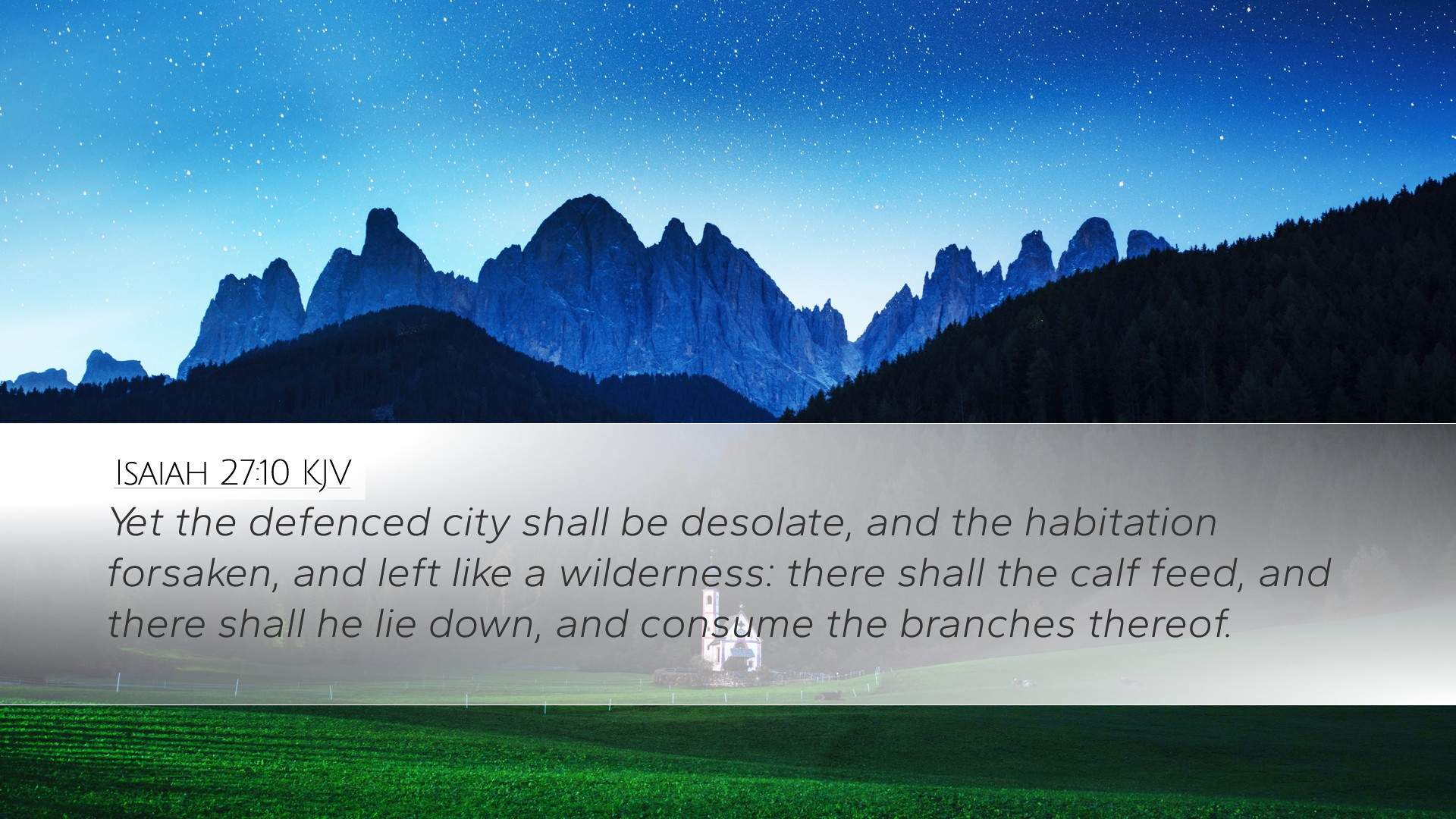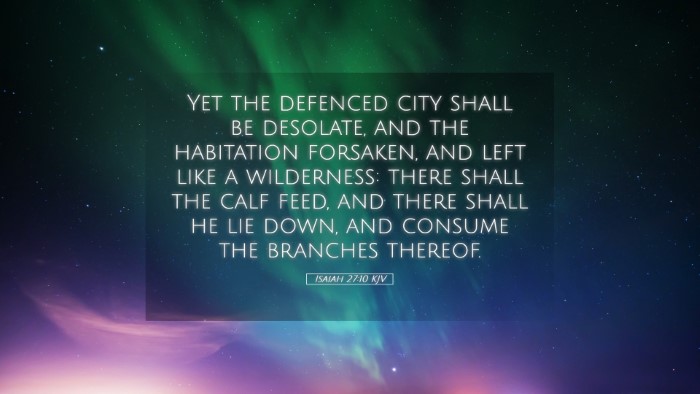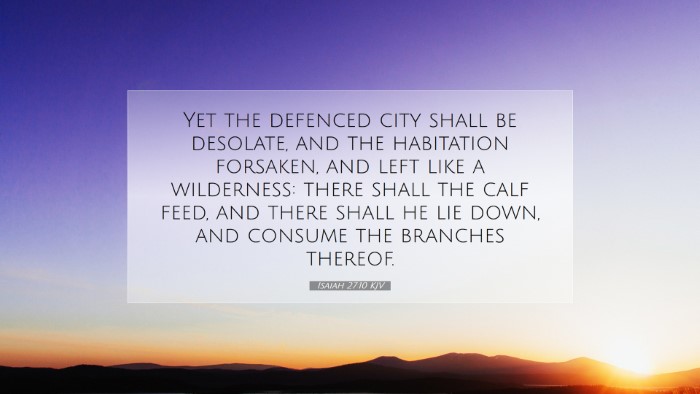Commentary on Isaiah 27:10
Isaiah 27:10 states: "Yet the defended city shall be desolate, and the habitation forsaken and left like a wilderness: there shall the calf feed, and there shall he lie down, and consume the branches thereof."
This verse speaks to the devastating consequences that emerge from divine judgment, encapsulating themes of desolation, abandonment, and a stark contrast between once-thriving urban life and the stark wilderness that follows. A thorough examination of this verse through various public domain commentaries provides deeper insights into its theological implications.
Context and Background
The Book of Isaiah is rich with prophetic declarations concerning Israel, the surrounding nations, and the ultimate sovereignty of God. Chapter 27 specifically emphasizes the future restoration of Israel, but it juxtaposes this hope with realities of judgment on the cities of opposition. Understanding this chapter's context reinforces the sense of God's ultimate authority and the interplay between judgment and restoration.
Insights from Matthew Henry
Matthew Henry, in his comprehensive commentary, notes that this verse encapsulates the transition from a fortified city that appears secure to utter desolation. He highlights that the "defended city" symbolizes nations opposed to God's people and His kingdom. His observations point out that when a city, representing strength and defiance against God, falls, it exemplifies the futility of relying on human strength.
Henry emphasizes that the imagery of a deserted habitation—left “like a wilderness”—expresses the complete reversal of fortune that is possible under God's judgment. The former inhabitants will be completely absent, signifying the loss of protection and peace. This desolation leads to a setting where “the calf feeds,” suggesting a return to nature and a complete abandonment of human civilization. Such imagery serves as a warning against arrogance and self-sufficiency absent of divine oversight.
Albert Barnes' Perspective
Albert Barnes offers a more detailed interpretation of the geographical and historical implications of the destruction described in the verse. He suggests that this prophecy signifies a profound spiritual lesson; the forsaking and desolation speak to the results of turning away from God. In his view, the imagery isn't solely about physical desolation but also reflects spiritual barrenness.
Barnes elaborates that the mention of the calf feeding implies that in the absence of humanity, nature reclaims the space. This reflects a broader theological point regarding the sovereignty of God over creation—when humanity neglects divine commandments, even the land itself protests against human pride and sin. To him, this is a clear message that God's judgment is inevitable, but coupled within that message is a theme of hope: for after desolation, restoration awaits for those who return to turn back to God.
Adam Clarke's Interpretation
Adam Clarke, a notable biblical scholar, contributes a critical perspective focused on the prophetic dimension of the imagery used in Isaiah 27:10. He stresses that this desolation hints at the consequences faced by those who choose the path of rebellion against God. Clarke articulates the pain of loss but juxtaposes it with God's ongoing promise of restoration to His people.
Furthermore, Clarke draws attention to the juxtaposition of a once-defended city now becoming a home for cattle. This imagery suggests that what was once a place of human dignity and civilization can swiftly devolve into a space fit for animals. It serves not only as a warning but as a reminder of the fleeting nature of pride and power when detached from God’s will.
Theological Implications
-
Divine Sovereignty: The desolation that Isaiah describes illustrates God's supreme authority over nations and cities. It serves as a reminder to all, especially leaders, of the consequences of rejecting divine authority.
-
Human Pride: The transition from a defended city to desolation underscores the fragility of human strength when not aligned with divine purpose. This serves as a caution against self-reliance, highlighting the necessity of humbling oneself before God.
-
Restoration and Hope: Despite the graphic imagery of destruction, within Isaiah’s prophecies often lies the promise of future restoration. Isaiah 27, while emphasizing judgment, points toward hope and redemption for those who remain faithful.
-
Environmental Theology: The imagery of nature reclaiming space when humanity neglects its responsibilities evokes a conversation about stewardship. God's creation reflects His will, and when humanity fails to live righteously, it illustrates a dissonance where even nature suffers from human sin.
Summary
Isaiah 27:10 serves as a compelling warning against the arrogance of nations and individuals that stand opposed to God's ways. Through the observations of Matthew Henry, Albert Barnes, and Adam Clarke, we find a multifaceted understanding of desolation as indicative of spiritual realities, human pride, and divine sovereignty.
As we glean insights from this powerful verse, may it shape our understanding of God's character, the importance of humility, and the hope of restoration, ensuring that we embrace the lessons of the past to inform our future conduct as the church and as followers of Christ.


